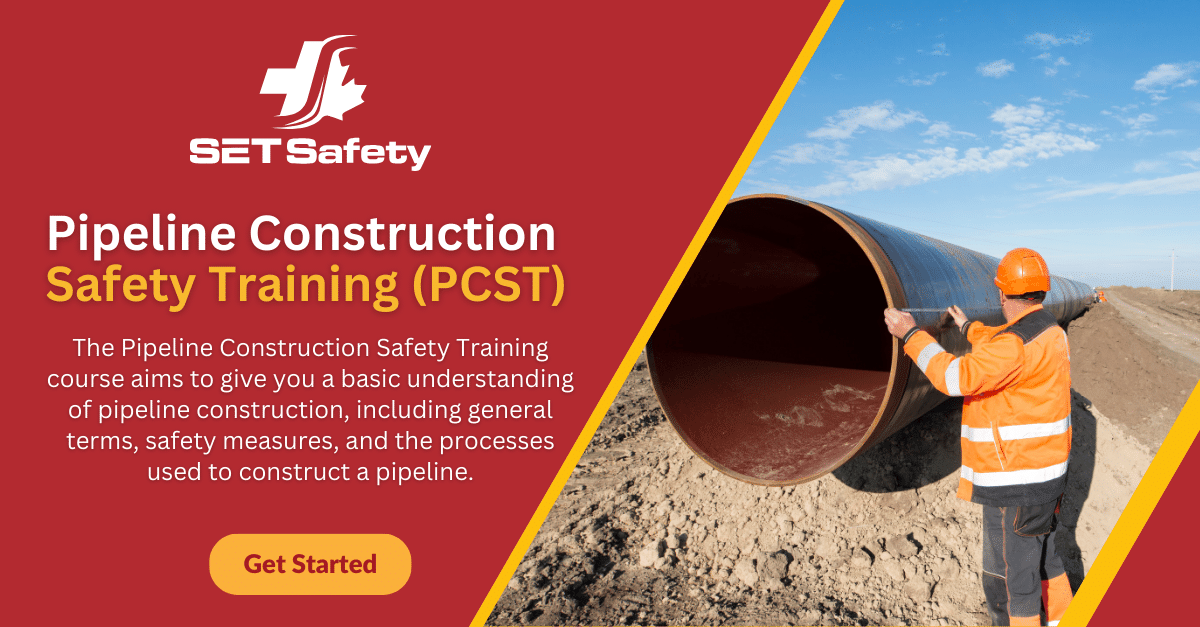ONLINE Pipeline Construction Safety Training (PCST) – updated 2023
SET Safety is proud to announce our brand-new PCST online course designed to elevate your safety awareness during pipeline construction projects.
The content covered in this online course is presented in the following 10 chapters:
-
- General Overview
- General Hazards
- Chemical Hazards
- Personal Protective Equipment (PPE)
- Working Environments
- General Rights and Responsibilities
- Right of Way Preparation
- Pipe Assembly
- Pipe Installation and Cleanup
- Incident and Emergency Response
Gold Seal Canadian Construction Association (CCA) Recognized ONLINE Course
Recognized courses in the context of Gold Seal Certification are educational programs that have been reviewed and approved by the CCA. These courses are designed to provide professionals in the Construction industry with valuable knowledge and skills relevant to their roles. Courses that are recognized by the Gold Seal Certification program meet certain quality standards and contribute to the professional development of individuals seeking certification.
10 Key Benefits to Pipeline Construction Safety Training
-
- Hazard Identification and Assessment: Train workers to identify potential hazards such as excavation risks, heavy machinery operation, confined spaces, hazardous materials, and more. Teach them how to assess the severity of each hazard and its potential impact on safety.
- Worker Safety: Pipeline Construction Safety training equips workers with the knowledge and skills to identify and mitigate potential hazards, follow safety protocols, use protective equipment, and respond effectively to emergencies. This reduces the risk of accidents, injuries, and fatalities on the job.
- Compliance: Proper Pipeline Construction Safety training helps ensure that workers and companies are compliant with safety regulations. Compliance not only avoids legal issues but also contributes to a safer work environment.
- Environmental Protection: Pipelines often traverse through environmentally sensitive areas. Safety training may include guidelines for preventing spills, leaks, and other environmental hazards.
- Environmental Protection: Pipelines often traverse through environmentally sensitive areas. Safety training may include guidelines for preventing spills, leaks, and other environmental hazards.
- Efficiency and Productivity: Well-trained workers are more efficient and productive. When workers are aware of safety protocols and best practices, they can work confidently and efficiently without compromising their well-being.
- Cost Savings: Safety training can lead to cost savings in the long run. Preventing accidents and injuries reduces medical expenses, workers’ compensation claims, and potential legal costs. It also minimizes equipment damage and repair costs resulting from mishandling.
- Positive Company Culture: Organizations that invest in safety training showcase their dedication to the welfare of their workforce. This fosters a positive company culture that values workers’ health and safety. Such a culture has the potential to enhance employee spirits, strengthen loyalty, and bolster retention rates.
- Emergency Response: Teach workers how to respond to different types of emergencies, including injuries, fires, chemical spills, and other incidents.
- Health and Wellness: Address the importance of maintaining physical and mental health during pipeline construction projects. Promote practices such as hydration, proper nutrition, rest, and stress management.
Who Should Attend?
Pipeline construction workers, supervisors, managers, safety officers, and anyone committed to creating a culture of safety excellence on the worksite.
PCST certification can enhance your career prospects. It’s important to complement your training with continued professional development, practical experience, and other relevant skills to achieve well-rounded career growth in the construction industry.
This robust online training program can be taken online 24/7.
Pipeline construction safety training is a critical aspect of ensuring the well-being of workers and the surrounding environment during the construction of pipelines. It involves educating and preparing workers about the potential hazards and risks associated with pipeline construction activities, as well as teaching them how to prevent accidents, injuries, and environmental damage.

